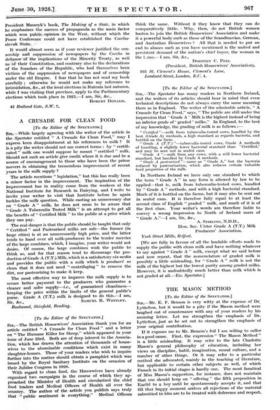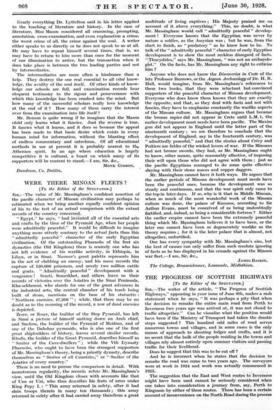THE MASON METHOD
[To the Editor of the SPECTATOR.]
Sin,—Mr. E. F. Benson is very witty at the expense of Dr, Lyttelton, but it would be a pity if the Mason method were laughed out of countenance with any of your readers by his amusing letter. Let me strengthen the emphasis of Dr. Lyttelton, just as he set out to strengthen the emphasis of your original contribution.
If it exposes me to Mr. Benson's foil I am willing to suffer in a good cause. First, the expression " The Mason Method " is a little misleading. It may refer to the late Charlotte Mason's general philosophy of education, including her views on discipline, habit, imagination, moral culture, and a number of other things. Or it may refer to a particular method she advocated, mainly in the teaching of literature, but applicable to certain other subjects as well, of which French in its initial stages is hardly one. The most fanatical of Miss Mason's supporters, for instance, does not maintain that one should keep on " offering " the fifth proposition in. Euclid to a boy until he spontaneously accepts it, and that till that happy moment arrives all rejections of the material submitted to him are to be treated with deference and respect. _ Nearly everything Dr. Lyttelton said in his letter applied to the teaching of literature and history. In the case of literature, Miss Mason considered all cramming, prompting, annotation, cross-examination, and even explanation a crime, the worst crime of all, the crime against the soul. A writer
either speaks to us directly or he does not speak to us at all. He may have to repeat himself several times, that is, we may have to return to him more than once for the moment of our illumination to arrive, but the transaction when it does take place is between the two leading parties and not by intermediaries.
The intermediaries are more often a hindrance than a
help. They destroy the one real essential to all vital know- ledge, the avidity of the soul itself.. Of other kinds of know- ledge our schools are full, and examination records bear eloquent testimony to the rigour and perseverance with which this knowledge has been crushed into the mind. But hOw many of the successful scholars really love knowledge at the end of it ? How many of them carry the interest
over from the examination into life itself ? • Mr. Benson is quite wrong if he imagines that the Mason child only learns what it fancies. Just the reverse is true. It fancies what it learns, and it does so because the appeal has been made to that basic desire which exists in every human mind for information, without the blunting effect of endless commentary and catechism. Of all educational methods in use at present it is probably nearest to the Athenian spirit. In an age where education is largely competitive it is cultural, a boast on which many of its supporters will be content to stand.—I am, Sir, &c., Dundrum, Co. Dublin. MONK GIBBON.









































 Previous page
Previous page